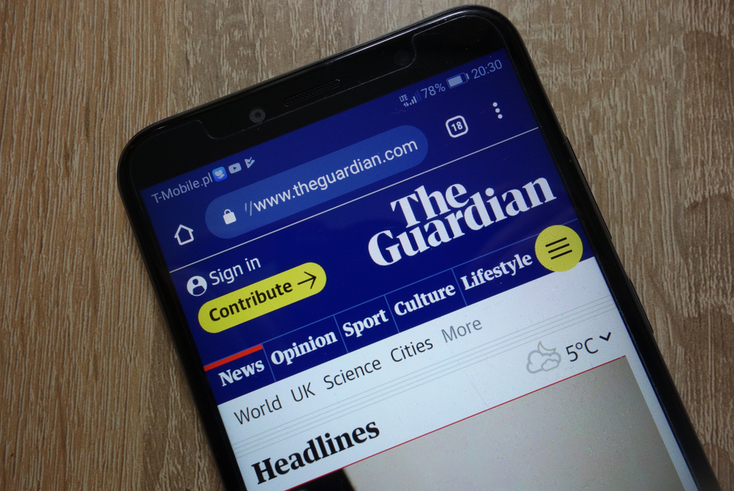How The Guardian’s adtech deal promises ’embers of hope’ for protecting publishers

A deal between The Guardian and British adtech company Illuma could pave the way for further publishers to ensure their content is protected while making money from contextual advertising.
The newsbrand’s agreement with Illuma, announced Thursday, will allow the company to categorise article webpages for contextual advertising purposes while ensuring intellectual property (IP) rights are protected.
“Publishers have the right to control who does what with their intellectual property,” said Illuma CEO Peter Mason. “This agreement with The Guardian acknowledges the legal framework around the process of collecting and using data, making it transparent, fair and equitable.”
The partnership has been endorsed by the Association of Online Publishers (AOP) and is the first standalone commercial licence to use data from The Guardian‘s website for contextual targeting purposes.
The move comes just weeks after AOP managing director Richard Reeves published an open letter decrying “unscrupulous” tech vendors of stealing publishers’ IP through data scraping practices.
Reeves and Mason both divulged to The Media Leader that Illuma is in conversations with “many other leading publishers”.
“We see this as the start of a movement – the brands and agencies we work with are keen to future-proof their targeting and to work with publisher-verified technology,” added Mason.
While advertising against content is hardly new to news publishing, contextual ad placements have risen in importance in recent years as audience targeting becomes a more difficult enterprise. GDPR restrictions and browser blocks on advertiser cookies have reduced incentives to follow online users with ads across websites.
Reeves and industry-backed online ads sales house Ozone have recently expressed public complaints about the issue of IP theft in a broad sense, while The Guardian directly stated it has been victim of illegal data scraping practices.
How digital publishers are fighting for more control over their IP
“At the moment, we know that some companies allow advertisers to target context on our site without our permission to do so,” wrote The Guardian‘s director of commercial strategy and operations Katherine Le Ruez. “These are often companies that industry trade bodies, such as TAG and IAB UK, require publishers to allow on our sites to prevent advertising running on article pages featuring specific words, or types of news (such as politics or our coverage of the war in Ukraine).
“Unfortunately, some of these companies are also scraping text and data from our website to create tools that claim to allow advertisers to target relevant article pages, without legal permission from The Guardian. We agree with the Association of Online Publishers that this isn’t good for marketers, publishers or consumers.”
The agreement will allow Illuma access to The Guardian’s Open API, which enables third parties to license the use of its content and IP in “an open, transparent, and privacy-friendly way.”
The adtech company will thus be able to classify site pages without the need for data scraping. It will also mean The Guardian will have “greater control and insight” into how its IP is being used to monetise contextual advertising on its website.
“With Illuma, we will have clear guidelines on what data can be accessed, how it can be used, and any other limitations or requirements,” continued Le Ruez. “We also have an agreement to share data and insights into the targeting that is being applied.”
Speaking to The Media Leader, Adam Foley, former Guardian UK director of advertising and now CEO of independent media agency Bountiful Cow, applauded the timing of the move. “Quality journalism isn’t cheap, but at a time when we need it more than ever, it’s never been more financially threatened. Truth has been under assault like never before over the last ten years and the rapid emergence of AI is only going to muddy that picture.
“In that context, any initiative that gives publishers more control over the value of their hard-earned IP and stops third-party adtech businesses making entirely unearned money off the back of the brilliant work of journalists has to be applauded. It will deliver a better quality experience for advertisers with more robust data and make sure that the money goes to the right people.”
The Guardian said it seeks to have additional “productive conversations” with other third parties about creating legal contracts by which its data can be licensed in order to further deter the practice of unauthorised scraping.
Speaking further on the development, Reeves called the partnership an “excellent example of how the industry should approach data practices.”
“This partnership demonstrates that a collaborative approach, in which both sides benefit, can work for the greater good of a healthy digital media ecosystem and I hope to see more conversations like this with practitioners across the sector,” said Reeves. “In the meantime, we need advertisers, their agencies and our ‘industry standards’ bodies to continue to speak out against vendors that obtain contextual data without consent.
“There are embers of hope that I hope will burn stronger as we start this conversation.”




